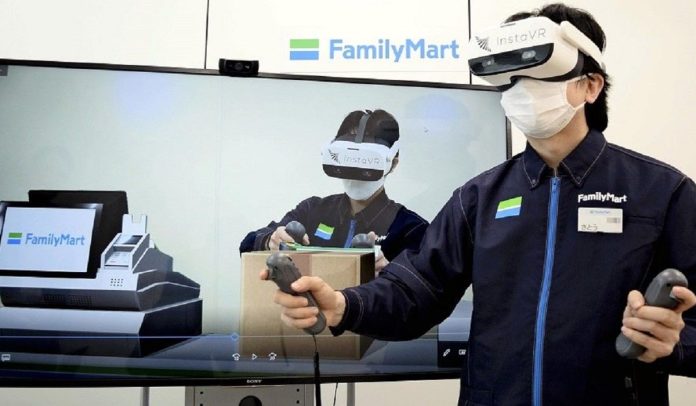Hotels, convenience stores and other businesses have increasingly turned to virtual reality to help train their staff amid a growing labour shortage.
VR has an advantage over conventional training manuals and in-person training as it allows staff to repeatedly receive realistic training. The use of VR has attracted attention as a means of maintaining high-quality customer service.
In March, convenience store chain operator FamilyMart Co. introduced VR equipment to give store employees customer service training. The employees wear VR goggles and use a controller to learn various tasks, including using the register, ordering products and accepting orders for delivery.
Conventional training requires an instructor to be present to teach the employees the various customer-related tasks at convenience stores, but with VR, the trainees can learn on their own, reducing the training time to one-third of the 36 hours normally required. The VR-based training is available in 10 languages, including Japanese, English, Chinese and Vietnamese.
“We hope to improve our customer service, even though we’ve been short-staffed,” said Daisuke Nonaka of the company’s store management operation department.
In January, Kyoto College of Hotel, Tourism and Bridal Management in Kyoto developed a VR-based educational programme for hotels and inns. The programme walks students through such tasks as working the front desk and taking restaurant reservations. The programme is designed in a way so the scenarios change depending on the responses from the trainees, allowing them to learn to handle various situations while interacting with different virtual guests.
The manufacturing, automobile and railway industries have taken the lead in introducing VR-based training in the areas of inspection and repair. VR has become an effective tool to allow staff to physically memorize procedures and safely experience some of the inherent dangers of the job.
Amid a serious labour shortage, the food service and lodging industries have increasingly launched VR training programs to improve efficiency.
The National Institute of Advanced Industrial Science and Technology in Tsukuba, Ibaraki Prefecture, has been researching and developing VR-based training since 2018. In February, the institute established guidelines for VR-based training for customer service. The guidelines include key points regarding reducing training costs, allowing companies to effectively teach their staff without the financial burden.
“The biggest challenge in the food service industry is cultivating staff,” said Takashi Okuma, a research team leader at the institute. “We hope the new technology will help reduce the burden and improve efficiency in the entire industry.” – The Yomiuri Shimbun (Japan News)






















